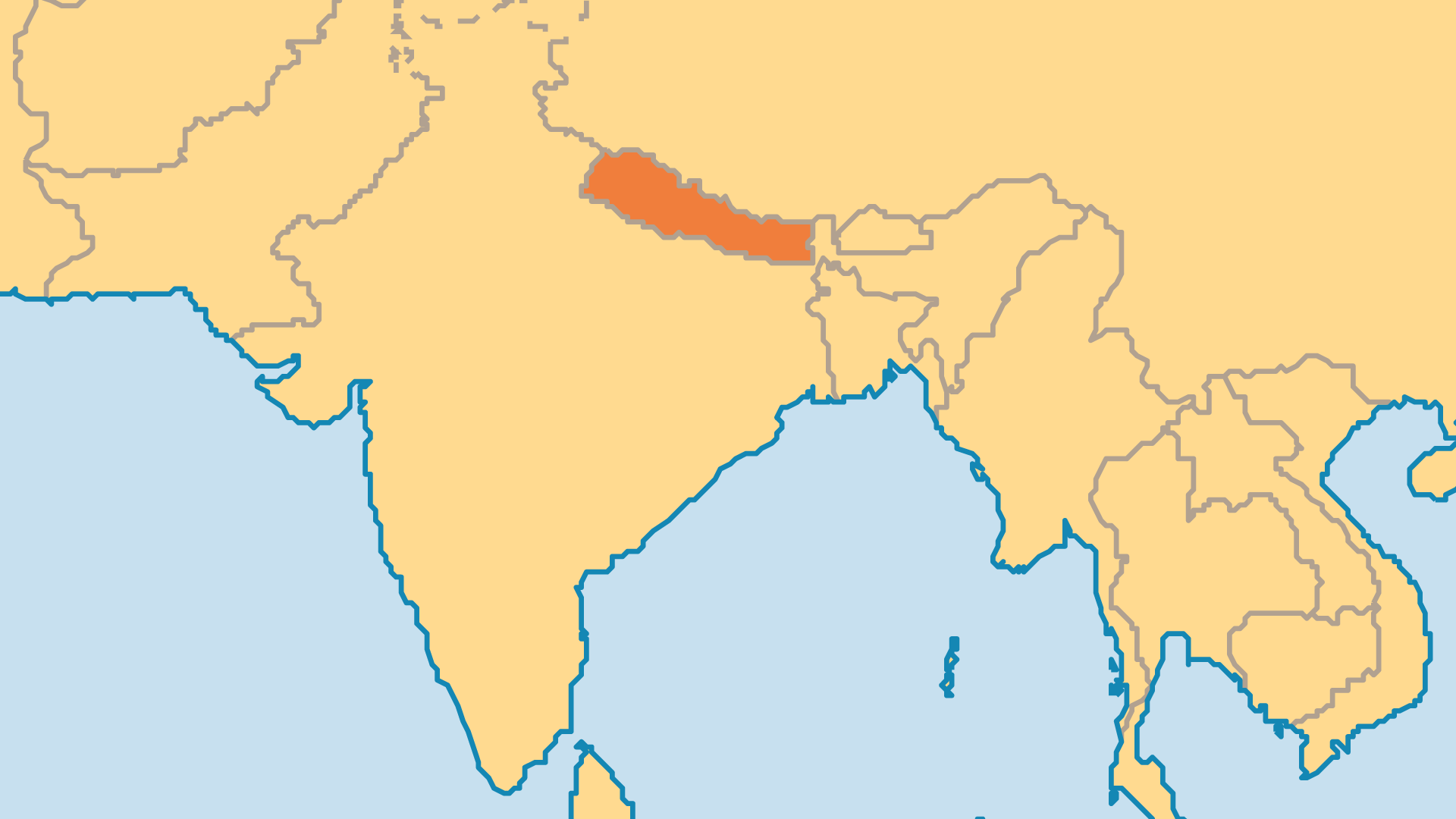Pray today
Nepal has experienced huge changes in the last 20 years. The absolute power of the Hindu monarchy ended in 2008, and a tumultuous decade followed that eventually saw the establishment of a federal republic as a secular state. This was an answer to the prayers of most Christians in Nepal! Although Nepal is a secular country, an anti-conversion law was passed in 2017, primarily intended to limit Christian evangelism and defend Nepal’s Hindu traditions. It has not succeeded in slowing the spread of the gospel; Nepal's Christians continue to share the good news. Pray for wisdom and courage for all who wish to be witnesses for Christ in Nepal.
More
Despite becoming a secular democracy, Nepal's social structures remain dominated by Hinduism. This perpetuates the caste system, which oppresses many, most notably Dalits who make up as much as 14% of the population. Caste discrimination is technically illegal but ubiquitous nonetheless. Converts from Hinduism to Christ usually become outcastes as well. Pray for the shattering of this unjust system.
Young people comprise two-thirds of Nepal's population, which is one of the world's youngest and fastest growing. Most live in rural areas, deprived of education and opportunity. Illiteracy is widespread. Young people are vulnerable to economic exploitation, sex trafficking, drug abuse, HIV/AIDS and radicalization (political or religious). Pray for changes here that offer young people hope and a future.
Freedom of religion is guaranteed by law, but only in limited measures. Non-Hindus cannot proselytize. If they do, they risk fines, imprisonment and, in the case of expatriates, expulsion. Despite this law, the Church in Nepal grows because of courageous evangelism. Hindu fundamentalists as well as Maoists often single out Christians; their non-violent nature and connections to the West make them soft targets. Pray for perseverance for believers, that neither laws of man nor threats of violence deter them from sharing the gospel.
Christian ministry must address a host of challenges under the government's watchful eye. High unemployment, illiteracy, low levels of development, environmental degradation and dependence on foreign aid are all being addressed by Christians. Pray for practical, sustainable and innovative ways to address the following issues:
- Child labour. An estimated 1.1 million children (although likely more) work as child labourers; 70% of them are forced to work 10-hour days or longer. The government seeks to eliminate the worst forms of child labour, such as mining and rag picking. Pray for the success of this programme. Education and subsequent development are impossible until Nepal gets children out of the workplace and into school.
- Trafficking of Nepali girls for the Indian, Middle Eastern and domestic sex trade. There are up to 300,000 girls in India alone (mainly in Mumbai), where they are terribly abused; possibly 90% of returnees are HIV-positive. AIDS has rapidly spread through the rest of society as a result, and there is no coherent national plan for AIDS prevention. Poor and lower-caste girls are the primary targets of this evil trade, and usually as unwilling victims. Nepali Christians reach and rescue some of these unfortunates in Nepal and in Mumbai.
- Health and disease. Over 20% of hospitals and clinics, and nearly all of leprosy-control work, are Christian-run (TLM, United Mission to Nepal, International Nepal Fellowship, others). Nepal suffers high rates of infant mortality and of deaths during childbirth. Community health is vital; over 80% of diseases are caused by a lack of basic sanitation, and 60% of the 50,000 child deaths each year are caused by malnutrition.
Pray for the less reached; around 55% of the population are unevangelized, and a staggering 309 peoples/castes are unreached. Pray for:
- The influential high-caste Hill Brahmin and Chhetri (Rajput). They represent 30.9% of the population and play a dominant role in shaping modern Nepal. While those in Nepal are more responsive than those in India, pride, fear and longstanding spiritual investments in Hinduism keep most in bondage, unable to openly proclaim Christ as Lord.
- The Awadhi and Bhojpuri speakers and Maithili of the Tarai lowlands on the Indian border. Few have heard the gospel, and even fewer have responded. The Tharu are more animist than Hindu; many small churches are springing up among them.
- The Mountain peoples, almost entirely Tibetan-related. Most are lamaistic Buddhists living in isolated mountain communities, such as the Loba people of Mustang. Most groups are small in number, and Christians are few. Among the famous Sherpa of the Everest region, where there is not a single church, there are perhaps 50 believers. Climbing for Christ seeks to reach them with the gospel.
- Tibetan refugees - long unreached, with no legal status and numbering 20,000. There is now a steady trickle seeking the Lord and a handful of congregations among them. Evangelistic International Ministries focuses on them.
- The increased number of Muslims. Most are Bengali, Kashmiri or Urdu-speaking farmers and unskilled labourers. Eastern Mennonite Missions seeks to develop a network to share Christ with them.
- University students. Over 450,000 students are in higher education - in 16 universities on 150 campuses. YWAM's seven bases include Kathmandu Centre with 65 on staff. The IFES-linked student movement, University Christian Students Fellowship of Nepal (NBCBS), has 62 groups with 2,100 students served by 10 workers. Campus Crusade for Christ is also highly active with 18 campus ministry teams.
The Nepali diaspora is recognized as 6.7 million, but the number of Nepalis illegally working abroad (by choice and increasingly by compulsion) may exceed 10 million. Nearly every family in Nepal has at least one member working away from home. Most go to India, but Nepalis can be found in over 100 nations. Nepalis abroad are more open to the gospel than are those at home. Numerous churches are established among Nepali migrants, even in restricted-access nations. Pray that creative ways might be found to share the good news with these scattered peoples.
- In India, Sikkim state is 75% Nepali, and Darjeeling district in West Bengal is 60% Nepali. Nepali churches in India, some established since the early 1900s, have sent their first missionaries to Nepal; pray for growth, release from stagnation and greater involvement in cross-cultural outreach.
- Many Nepalis serve as Gurkha soldiers in the British, Brunei and Indian armies. Others serve as security guards throughout Asia. Becoming a Gurkha is a great honour and a way to financial security for oneself and one's family; competition is fierce. There are some Christian groups working among these soldiers. Pray for effective outreach to them.
- Other Asian nations. The Persian Gulf nations host 87% of official Nepali migrant workers. Women working here are particularly vulnerable to exploitation and unfair treatment. Pray for outreach to them; they can easily get lost in the crowd of migrant labourers in the Gulf. Malaysia has seen rapid Christian growth among Nepali migrant workers, with more than 50 Nepali congregations now operating there.
Bible translation. William Carey first translated the NT into Nepali in 1821. Eight of Nepal's 80 languages have a complete translation; an estimated 44 have further translation needs, but low literacy hampers the effectiveness of all translations. Pray for the translation teams. Pray also for literacy programmes that will uplift the populace in so many ways, in addition to Bible reading.
More Information
- Get all of this content and daily notifications in our free mobile app. Download here ›
- Sign up for a daily e-mail that gets you the featured prayer point of the day straight to your inbox.
- This content is a curated selection of points from our book, Operation World. Find out more about it and all the rest of Our Publications ›
Content taken or adapted from Operation World, 7th Edition (2010) and Pray for the World (2015). Both books are published by InterVarsity Press. All rights reserved.


